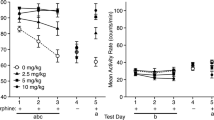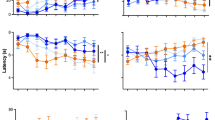Abstract
Two groups of adult male rats were injected daily with ethanol (1.5 g/kg IP in 15% w/v solution) either before (the behaviourally augmented tolerant group) or after (the physiologically tolerant group) being placed in operant chambers. The control groups received daily isotonic saline injections either before or after the operant task. When challenged with ethanol (2.5 g/kg) on day 30 prior to the operant task, the control group was most impaired, while the behaviourally augmented tolerant group was significantly less impaired than the physiologically tolerant group. The two ethanol-treated groups were impaired to the same extent when challenged on day 60. Partial generalization of this behavioural tolerance to ethanol was observed, as the behaviourally augmented tolerant group was less impaired than the physiologically tolerant group for a tail flick response to painful stimuli after an ethanol challenge on day 30. However, the two ethanol-treated groups exhibited similar impairments of locomotor activity after an ethanol challenge on day 40. No differences in muscarinic receptor binding among the control and two ethanol-treated groups were found. These findings demonstrate that behaviourally augmented tolerance to ethanol may be partially generalizable but is unrelated to changes in muscarinic cholinergic receptors.
Similar content being viewed by others
References
Brown OM, Post ME, Mallov S (1977) Effects of ethanol on rat brain and heart acetylcholine. J Stud Alc 38:603–605
Chen CS (1968) A study of the alcohol-tolerance effect and an introduction of a new behavioural technique. Psychopharmacologia 12:433–440
Chen CS (1979) Acquisition of behavioural tolerance to ethanol as a function of reinforced practice in rats. Psychopharmacology 63:285–288
Crow LT, Highbee MW (1977) Behavioural augmentation of tolerance to ethanol and the response measure. Bull Psychonon Soc 10:5–8
Erickson CK, Graham DT (1975) Alteration of cortical and reticular acetylcholine release by ethanol in vivo. J Pharmacol Exp Ther 185:583–585
Hall JF (1976) Classical conditioning and instrumental learning: A contemporary approach. J. B. Lippincott, New York, pp 119–120
Hunt WA, Dalton TK (1976) Regional brain acetylcholine levels in rats acutely treated with ethanol or rendered ethanol dependent. Brain Res 109:628–631
Hunt WA, Dalton TK (1981) Neurotransmitter-receptor binding in various brain regions in ethanol-dependent rats. Pharmacol Biochem Behav 14:733–739
Kalant H, LeBlanc AE, Gibbons RS (1971) Tolerance to, and dependence on, some non-opiate psychotrophic drugs. Pharmacol Rev 23:135–191
Le Blanc AE, Gibbins RJ, Kalant H (1973) Behavioural augmentation of tolerance to ethanol in the rat. Psychopharmacologia 30:117–122
Le Blanc AE, Gibbins RJ, Kalant H (1975) Generalization of behaviourally augmented tolerance to ethanol in the rat. Psychopharmacology 44:241–246
Le Blanc AE, Kalant H, Gibbins RJ (1976) Acquisition and loss of behaviourally augmented tolerance to ethanol in the rat. Psychopharmacology 48:153–158
Lowry OH, Rosebrough HJ, Farr AL, Randall RJ (1951) Protein measurement with the Folin phenol reagent. J Biol Chem 193:265–275
Mahoney WJ, Ayres JJB (1976) One-trial simultaneous and backward fear conditioning as reflected in conditioned suppression of licking in rats. Anim Learn Behav 4:357–362
Mann RE, Vogel-Sprott M (1981) Control of alcohol tolerance by reinforcement in nonalcoholics. Psychopharmacology 75:315–320
Mansfield JG, Woods SC (1982) Response specificity of behaviourally augmented tolerance to ethanol supports a learning model. Alcoholism: Clin Exp Res 6:148
Morgan EP, Phillis JW (1975) the effects of ethanol of acetylcholine release from the brain of unanaesthetized cats. Gen Pharmacol 6:281–284
Moss JN, Smyth RD, Beck H, Martin CJ (1967) Ethanol impact on brain acetylcholine and its modification by cysteine. Arch Int Pharmacodyn 167:235–240
Muller P, Britton RS, Seeman P (1980) The effects of long-term ethanol on brain receptors for dopamine, acetylcholine, serotonin and noradrenaline. Eur J Pharmacol 65:31–37
Nordberg A, Wahlstrom G (1982) Tolerance, physical dependence and changes in muscarinic receptor binding sites after chronic ethanol treatment in the rat. Life Sci 31:277–287
Overstreet DH, Yamamura HI (1979) Minireview: receptor alterations and drug tolerance. Life Sci 25:1865–1878
Pelham RW, Marquis JK, Kugelman K, Munsat TL (1980) Prolonged ethanol consumption produces persistent alterations of cholinergic function in the rat brain. Alcoholism: Clin Exp Res 4:282–287
Pert CB, Snowman AM, Snyder SH (1974) Localization of opiate receptor binding in synaptic membranes of rat brain. Brain Res 70:184–188
Phillis JW, Jhamandas KC (1971) The effects of chlorpromazine and ethanol on in vivo release of acetylcholine from the cerebral cortex. Comp Gen Pharmacol 2:306–312
Rawat AK (1974) Brain levels and turnover rates of presumptive neurotransmitters as influenced by administration and withdrawal of ethanol in mice. J Neurochem 22:915–922
Siegel S (1956) Nonparametric statistics for behavioral sciences. McGraw-Hill. New York
Siegel S (1979) The role of conditioning in drug tolerance and addiction. In: Keehn JD (ed) Psychopathology in animals: research and clinical applications. Academic Press, New York
Tabakoff B, Marcus-Munoz M, Fields J (1979) Chronic ethanol feeding produces an increase in muscarinic cholinergic receptors in mouse brain. Life Sci 25:2173–2189
Wenger JR, Tiffany TM, Bombardier C, Nicholls K, Woods SC (1981) Ethanol tolerance in the rat is learned. Science 213:575–577
Wenger JR, Berlin V, Woods SC (1982) Learned tolerance to the behaviorally disruptive effects of ethanol. Behav Neural Biol 28:418–430
Author information
Authors and Affiliations
Rights and permissions
About this article
Cite this article
Wigell, A.H., Overstreet, D.H. Acquisition of behaviourally augmented tolerance to ethanol and its relationship to muscarinic receptors. Psychopharmacology 83, 88–92 (1984). https://doi.org/10.1007/BF00427429
Received:
Accepted:
Issue Date:
DOI: https://doi.org/10.1007/BF00427429




